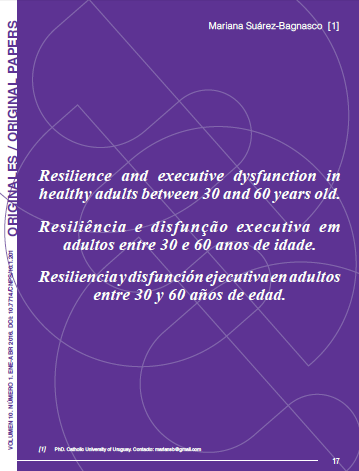Resilience and executive dysfunction in healthy adults between 30 and 60 years old / Resiliência e disfunção executiva em adultos entre 30 e 60 anos de idade / Resiliencia y disfunción ejecutiva en adultos entre 30 y 60 años de edad
Abstract
ABSTRACT
Objectives: To study of the possible associations between resilience and age, executive dysfunction and age, resilience and executive dysfunction, in healthy adults between 30 and 60 years old. Methods: A pilot, transversal study involving 180 subjects who met the inclusion and exclusion criteria. CD-RISC was use to assess resilience. DEX-sp was use to assess executive dysfunction.
Results: When testing bivariate associations between age, resilience and executive dysfunction, we found statistically significant associations between age and resilience (p = 0.001); age and executive dysfunction (p = 0.001); resilience and executive dysfunction (p = 0.001).
Conclusions: The present study found significant associations between age and resilience, between age and executive dysfunction and between resilience and executive dysfunction, in healthy adults between 30 and 60 years. Future studies might explore mediating variables among these associations and describe interactions between variables over time.
Keywords: resilience; executive dysfunction; healthy adults; neuropsychology; cognitive decline; empirical research.Â
RESUMEN
Objetivos: Estudiar la posible asociación entre resiliencia y edad, disfunción ejecutiva y edad, resiliencia y disfunción ejecutiva, en adultos entre 30 y 60 años. Métodos: Estudio piloto, transversal. Participaron 180 sujetos que cumplieron los criterios de inclusión y exclusión. La resiliencia y la disfunción ejecutiva se evaluaron mediante CD-RISC y DEX-sp, respectivamente.
Resultados: Ensayando asociaciones bivariadas entre edad, resiliencia y disfunción ejecutiva hallamos asociaciones estadÃsticamente significativas entre edad y resiliencia (p = 0.001); edad y disfunción ejecutiva (p = 0.001); resiliencia y disfunción ejecutiva (p = 0.001).
Conclusiones: Encontramos asociaciones significativas entre edad y resiliencia, edad y disfunción ejecutiva, resiliencia y disfunción ejecutiva, en adultos entre 30 y 60 años. Estudios futuros podrÃan explorar las variables que median en estas asociaciones y describir las interacciones entre la variables en el tiempo.
Palabras clave: resiliencia; disfunción ejecutiva; adultos; neuropsicologÃa; declive cognitivo decline; investigación empÃrica.
RESUMO
Objetivos: Estudar a possÃvel associação entre resiliência, idade e disfunção executiva em adultos entre 30 e 60 anos. Métodos: Estudo piloto, transversal. Participaram 180 sujeitos que cumpriram os critérios de inclusão. A resiliência e a disfunção executiva se avaliaram mediante CD-RISC e DEX-sp, respectivamente.
Resultados: Testando associações bivariadas entre idade, resiliência e disfunção executiva, achamos associações estatisticamente significativas entre idade e resiliência (p= 0.001); idade e disfunção (p = 0.001); resiliência e disfunção executiva (p = 0.001).
Conclusões: Encontramos associações significativas entre idade e resiliência, idade e disfunção executiva, resiliência e disfunção executiva, em adultos entre 30 e 60 anos. Estudos futuros poderiam explorar as variáveis que mediam nestas associações e descrever as interações entre as variáveis no tempo.
Palavras-chave: resiliência, disfunção executiva, adultos, neuropsicologia, diminuição cognitivo, investigação empÃrica

Downloads
How to Cite
Issue
Section
License
Articles published in this journal are protected under the Creative Commons Attribution-NonCommercial-ShareAlike 4.0 International (CC BY-NC-SA 4.0) license. This means that authors retain full rights over their research and publications at all times. As a journal, we fully respect and promote the principles of open access established by this license, allowing the work to be shared, adapted, and distributed for non-commercial purposes, provided that appropriate credit is given to the authors and any derivative works are licensed under the same terms.
Authors are responsible for obtaining the required permission when they wish to reproduce part of the material (figures, etc.) from other publications.
Likewise, CNPs allows authors to host in their personal sites or other repositories that they deem convenient the Final and Definitive Version of the published article with the format assigned by the journal. In no case do we allow access to preprints of the article under evaluation or already published.
When submitting an article to CNPs you are aware that all the contents of CNPs are under a Creative Commons License. In which it is allowed to copy and share the contents freely, always making reference to the origin of the publication and its author.











